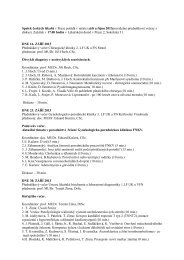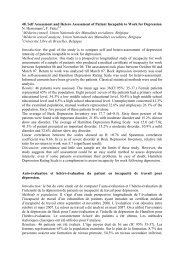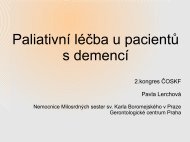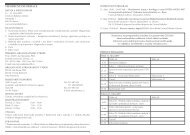ABSTRACTS â ORAL PRESENTATIONS - AMCA, spol. s r.o.
ABSTRACTS â ORAL PRESENTATIONS - AMCA, spol. s r.o.
ABSTRACTS â ORAL PRESENTATIONS - AMCA, spol. s r.o.
Create successful ePaper yourself
Turn your PDF publications into a flip-book with our unique Google optimized e-Paper software.
of molecular biology we detected changes of proliferation (CyQUANT), differentiation<br />
(alkaline phosphatase activity) and cell death (phosphatidylserine externalisation,<br />
caspase activation, mitochondrial membrane potential, PARP cleavage). These changes<br />
were accompanied by altered expression of some apoptotic (caspase 9) and autophagic<br />
(LC3, p62) proteins. Application of fatty acids also affected lipid metabolism regulating<br />
proteins (fatty acid synthase, caveolin-1) as well as cell ability to incorporate and store<br />
fatty acids (FAT/CD36, lipid droplet accumulation).<br />
In summary, our data suggest participation of PPARγ and specific signaling molecules<br />
in the effects of NaBt, DHA and their combination on colon cancer epithelial cell<br />
differentiation and death.<br />
Acknowledgements<br />
This work was supported by grants Nos. P301/11/1730, 13-097665 of the Czech Science<br />
Foundation, NT 11205-5/2010 and MSM0021622430 Ministry of Education, Youth and<br />
Sports.<br />
P37. INHIBITORS OF CELLULAR ENERGY METABOLISM CAN ACTIVATE PRO-SURVIVAL<br />
SIGNALING IN MALIGNANT MELANOMA CELLS<br />
Amandine Verlande, Stjepan Uldrijan<br />
Department of Biology, Faculty of Medicine, Masaryk University Brno, Czech Republic<br />
Metastatic melanoma is a type of cancer that is notoriously difficult to treat, with only<br />
a minority of patients responding to standard chemotherapeutics. In a search for new<br />
drugs with anti-melanoma activity we investigated the effect of inhibitors of cellular<br />
energy metabolism on malignant melanoma cell survival and the activity of several<br />
important intracellular signaling pathways.<br />
We used three different inhibitors of mitochondrial oxidative phosphorylation (OXPHOS):<br />
Rotenone, CCCP and Oligomycin A, in combinations with two hexokinase inhibitors<br />
(glycolysis pathway): 2-deoxy-D-glucose (2DG) and 5-thio-D-glucose (5TG) in both BRAFand<br />
NRAS-mutated melanoma cells.<br />
Our results show that treatment with the OXPHOS inhibitors leads to cell death that<br />
can be prevented when 2DG or 5TG is added at low, non-toxic concentrations. We show<br />
that these drug combinations induce activation of AKT and AMPK pro-survival pathways.<br />
Even though AKT is strongly activated by the combinations, the mTORC1 complex seems<br />
to be inactive as we observed a simultaneous upregulation of autophagy and inhibition<br />
of protein synthesis.<br />
Taken together, these unexpected results suggest that the combination of OXPHOS and<br />
hexokinase inhibitors can activate pro-survival pathways in malignant melanoma and<br />
prevent cancer cell death.<br />
Analytical Cytometry VII 131








